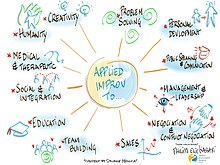Applied improvisation
Applied improvisation is the application of improvisational theatrical methods in various non-theatrical fields, including consulting, training, and teaching. It is known to be used as an experiential educational approach which enables participants to explore and improve their leadership, management and interpersonal capabilities in several fields, which include collaboration, communications, creativity, and team-building.
History[edit]
Applied improvisation began in the late 1990s with the performative turn in social science.[1] The increased focus on performance and improvisation led to the application of improvisational methods in non-theatrical fields.[2] In 2002, the Applied Improvisation Network was founded, a non-profit organization of people committed to using applied improvisation.[3]

Applied improvisation sees use in consulting and corporate training, particularly in the areas of sales and leadership.[4][5] Applied improvisation is also often used in design thinking, service design, and UX design.[6][7][8]
In addition to the business world, applied improvisation sees use in disaster readiness training, drama therapy, medicine, and education.[9][10][11][12]
Further reading[edit]
- Landgraf, Edgar. 2014. Improvisation as Art: Conceptual Challenges, Historical Perspectives. Bloomsbury Academic. ISBN 9781441146946
- Sawyer, Keith. 2011. Structure and Improvisation in Creative Teaching. Cambridge University Press. ISBN 9780521746328
- Schinko-Fischli, Susanne, 2018, Applied Improvisation for Coaches and Leaders: A Practical Guide for Creative Collaboration, Routledge. ISBN 9781138315266
- Dudeck, Theresa Robbins and McClure, Caitlin, 2018, Applied Improvisation: Leading, Collaborating, and Creating Beyond the Theatre, Methuen Drama. ISBN 9781350014367
- Dudeck, Theresa Robbins and McClure, Caitlin, 2021, The Applied Improvisation Mindset: Tools for Transforming Organizations and Communities, Methuen Drama. ISBN 978-1350143616
References[edit]
- ^ Haseman, Brad (2006-02-01). "A Manifesto for Performative Research" (PDF). Media International Australia Incorporating Culture and Policy. 118 (1): 98–106. doi:10.1177/1329878X0611800113. S2CID 145271889. Archived (PDF) from the original on Jan 1, 2024.
- ^ Biggs, Michael A. R.; Karlsson, Henrik, eds. (2012). The Routledge Companion to Research in the Arts. London: Routledge. ISBN 9780415697941. OCLC 751832557.
- ^ "History of AIN". Applied Improvisation Network. Retrieved 14 February 2022.
- ^ Sirkin, David; Ju, Wendy (2015). "Embodied Design Improvisation: A Method to Make Tacit Design Knowledge Explicit and Usable". Design Thinking Research. Understanding Innovation. Springer, Cham. pp. 195–209. doi:10.1007/978-3-319-06823-7_11. ISBN 978-3-319-06822-0.
- ^ van Bilsen, Gijs (2013). Yes and ... your business : the added value of improvisation in organisations. ISBN 9789081950602. OCLC 856568528.
- ^ "Why Improv Training Is Great Business Training". Forbes. Retrieved 2017-08-12.
- ^ "The Politics and Theatre of Service Design (PDF Download Available)". ResearchGate. Retrieved 2017-08-12.
- ^ "The Creative Impact of Improvisation". 2014-01-07. Retrieved 2017-08-12.
- ^ Tint, Barbara S.; McWaters, Viv; van Driel, Raymond (2015-04-07). "Applied improvisation training for disaster readiness and response". Journal of Humanitarian Logistics and Supply Chain Management. 5 (1): 73–94. doi:10.1108/JHLSCM-12-2013-0043. ISSN 2042-6747.
- ^ "Improvisation: Yes and Psychotherapy! | Adler Graduate School". alfredadler.edu. Retrieved 2017-08-12.
- ^ Rossing, Jonathan P.; Hoffmann-Longtin, Krista (2016-06-01). "Improv(ing) the Academy: Applied Improvisation as a Strategy for Educational Development". To Improve the Academy. 35 (2): 303–325. doi:10.1002/tia2.20044. hdl:2027/spo.17063888.0035.206. ISSN 2334-4822.
- ^ "Whose Classroom Is It, Anyway? Improvisation as a Teaching Tool (PDF Download Available)". ResearchGate. Retrieved 2017-08-12.
